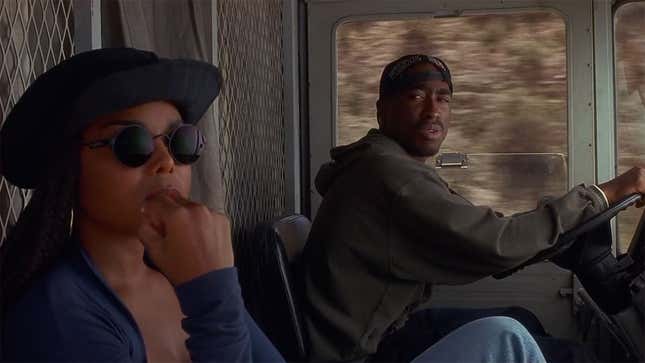

There are imperial phases—the period in a pop star’s career when virtually everything they touch is gold and received by the public as such—and then there is Janet Jackson’s imperial phase. It spanned her breakout third album, 1986’s Control, through 1993’s janet. In the U.S., both of those albums spawned a massive six hit singles (seven for Control if you count the quiet-storm radio staple “Funny How Time Flies (When You’re Having Fun”), and the album that came between them, 1989’s Janet Jackson’s Rhythm Nation 1814, has the distinction of being the only album to turn out seven singles to peak in the top five of the Billboard Hot 100 chart (not counting reissued “deluxe” versions of preexisting albums like Katy Perry’s Teenage Dream). And all before Jackson turned 30.
Between Rhythm Nation and janet., Jackson had her sights set on Hollywood, and she met the perfect person to take her there. Hot off his sensitive and lucrative portrayal of coming of age in South Central, Los Angeles, 1991’s Boyz N the Hood, the young director John Singleton met Jackson and suggested they work together. He promised her he had a script for her. She said she’d take a look. In truth, there was no script, but as he recalls in an extra on the 2019 Blu-ray release of Poetic Justice, the film that the writer-director would ultimately make with Jackson, he scrambled and within two weeks had a screenplay to show Jackson. It was what Singleton referred to as a “street romance”—the flip side of the coin Singleton tossed with Boyz that this time explored womanhood in South Central, L.A. Jackson loved it and signed on. Though she had yet to cross over to movies, Jackson was a veteran actor, initially penetrating cultural consciousness via television, years before her music made her a superstar.
However memorable her roles in Good Times, Diff’rent Strokes, and Fame were, in the ’90s there was still a large status divide between TV actors and those in movies (those who crossed over from the former to the latter were the exception, not the rule and crossing the other way was seen as a step down). Poetic Justice would be Jackson’s first official attempt at adding “movie star” to her already impressive resumé.
In the film, she played Justice, a part-time poet (Justice was poetic… get it?) who does hair and grieves the murder of her boyfriend Markell (played by Q-Tip in a cameo). She reluctantly tags along with her friend Iesha (Regina King) up the coast of California on a mail run undertaken by Iesha’s mail carrier boyfriend Chicago (Joe Torry) and Chicago’s colleague Lucky (Tupac Shakur). Lucky had previously macked on Justice while delivering mail to the beauty parlor at which she works, which makes the already prickly Justice even more on edge during the first half of their trip.
Insofar as that’s essentially the extent of the plot, Poetic Justice certainly feels like a script banged out in weeks. There are inspired moments, like the clip posted above wherein Justice dismisses Lucky by pranking him with the suggestion that she’s having sex with her employer Jessie (the perpetually underrated Tyra Ferrell), but Poetic Justice is in many ways a smaller movie than Boyz, despite it being afforded twice the budget.
In his director’s commentary on the home media releases of Justice, Singleton (who died last year) said that “putting the urban experience in a normal context” was his aim here. “I was really trying to show how two people with their own sets of problems and complex things going on, how they came together,” he continued. Whereas in Boyz, the hood was in the foreground, in Justice it’s the backdrop. This is a film about what it is to live with death, and how existential threats to Black lives shape characters. Justice is externally defined by her unsmiling nature, a point Lucky seizes on immediately. “Why you always so mad?” he asks her. “You must ain’t got no man ’cause you don’t never smile.” Poetic Justice spends much of its running time exploring why Justice rarely smiles.
-

-

-

-

-

-

-

-

-

-

-

-

-

-

-

-

-

-

-

-

-

-

-

-

-

-

-

-

-

-

-

-

-

-

-

-

-

-

-

-








































